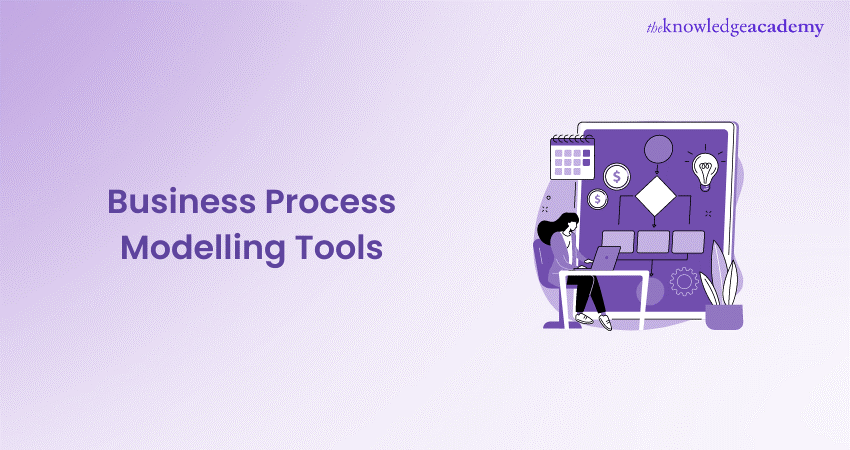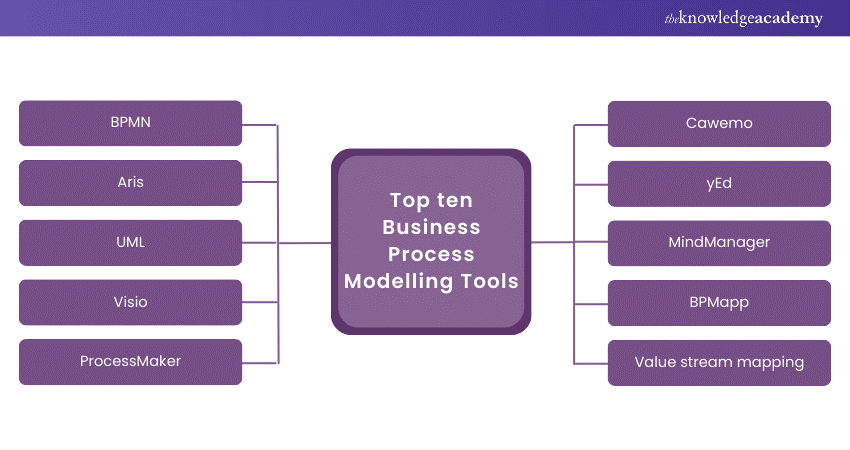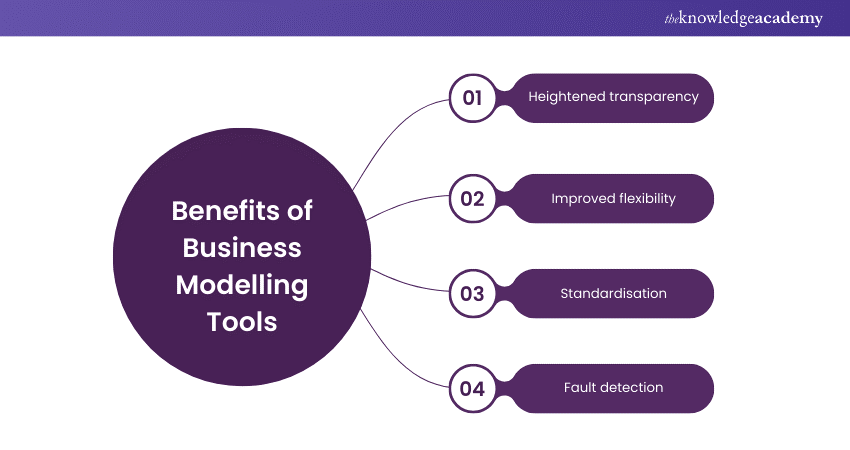We may not have the course you’re looking for. If you enquire or give us a call on +61 272026926 and speak to our training experts, we may still be able to help with your training requirements.
We ensure quality, budget-alignment, and timely delivery by our expert instructors.

By leveraging Business Process Modelling Tools, businesses can gain insights into their processes and implement changes that drive innovation and growth. Join us to explore BPM Tools, unlock process optimisation potential, and drive business success through innovation and efficiency.
Get ready to go out on an adventure of exploration! In this blog, we’ll explore the top ten Business Process Modelling Tools and uncover their advantages. So, let’s dive in and discover more!
Table of Contents
1) What is Business Process Modelling?
2) Top ten Best Business Process Modelling Tools
a) BPMN
b) Aris
c) UML
d) Visio
e) ProcessMaker
f) Cawemo
g) YEd
h) MindManager
i) BPMapp
j) Value stream mapping
3) Advantages of Business Modelling Tools
4) Conclusion
What is Business Process Modelling?
Business Process Modelling is a methodical approach aimed at visualising and comprehending organisational processes. It entails crafting graphical depictions of these processes to facilitate analysis, optimisation, and efficiency enhancement.
By representing workflows and activities visually, Business Process Modelling enables stakeholders to identify bottlenecks, redundancies, and areas for improvement. Structured visualisation helps streamline operations, improve team coordination, and elevate productivity and effectiveness within organisations.
Top ten Business Process Modelling Tools
Discover the top ten Business Process Modelling Tools that streamline operations and enhance efficiency within organisations.

1) BPMN
Business Process Model and Notation (BPMN), stands as a widely embraced graphical standard utilised for illustrating business processes in Business Process Modelling. Serving as a universal language, it ensures stakeholders can readily grasp processes. Its adaptable framework caters to processes of varying intricacies.
By embracing BPMN, organisations enhance communication, promote clarity, and streamline the analysis and enhancement of business processes. This standardisation fosters efficiency and cohesion, facilitating a more comprehensive understanding and management of organisational workflows.
2) Aris
Aris stands out as a comprehensive platform designed to manage the business analysis processes through Business Process Modelling. Its suite of features encompasses modelling, simulation, and optimisation, catering particularly well to the needs of large enterprises grappling with intricate processes.
Aris provides a centralised hub for critical functions, facilitating efficient process management, analysis, and refinement. These fosters improved organisational performance and agility. Aris streamlines collaboration among teams, ensuring alignment and coherence in process optimisation efforts across the organisation.
Get ready for your interview with our top business analyst interview questions.
3) UML
Unified Modelling Language (UML) is a flexible modelling language predominantly used in software engineering. It's also applicable in Business Process Modelling, especially in IT environments.
While originally crafted for software systems, UML's adaptability extends to representing and analysing business processes. This versatility enables organisations to optimise IT-related workflows and operations, leveraging UML's rich set of diagramming tools to enhance efficiency and alignment between business objectives and technological implementations.
4) Visio
Visio, a Microsoft diagramming tool, stands out in Business Process Modelling for its pre-designed templates and intuitive interface. These features streamline the creation of process diagrams, making them accessible to users of varying expertise levels. Productivity and teamwork are further improved by its smooth integration with other Microsoft Office programmes.
Visio enables organisations to efficiently visualise and document their business processes, fostering clarity. Its features facilitate effective communication across teams, making it a preferred choice in the realm of process documentation and analysis.
5) ProcessMaker
ProcessMaker, an open-source Business Process Modelling software, streamlines workflow automation and management. It empowers users to craft, automate, and execute tailored business processes, incorporating workflows and forms. Its intuitive interface and comprehensive features facilitate seamless design, automation, and deployment of various processes.
ProcessMaker's flexibility caters to diverse organisational needs, fostering efficiency and productivity. With its user-friendly approach and robust capabilities, ProcessMaker stands as a potent tool for optimising and enhancing business operations, ensuring adaptability and scalability in dynamic environments.
6) Cawemo
Cawemo stands out as a cloud based BPMN modelling platform emphasising collaborative teamwork in Business Process Modelling. It supports concurrent editing by multiple users and provides robust version control, ensuring transparent tracking of modifications.
By fostering real-time collaboration, Cawemo streamlines team efforts and boosts productivity in process modelling endeavours. Its cloud-based nature facilitates accessibility and flexibility, allowing team members to contribute seamlessly from anywhere, making it an ideal choice for organisations prioritising efficient and cohesive teamwork in process modelling projects.
Dive into the Detailed Case Study of Business Analysis.
7) yEd
yEd stands out as a flexible, no-cost diagramming solution, boasting BPMN compatibility and an array of layout algorithms. Its appeal spans across user expertise levels, offering automated arrangement capabilities for process diagrams.
The software's comprehensive feature set ensures accessibility for both beginners and seasoned users alike, enabling efficient visualisation and analysis of processes. With yEd, users can effortlessly create and manage complex diagrams. It serves as an invaluable asset in various professional settings requiring meticulous process representation and evaluation.
8) MindManager
MindManager serves as a robust platform for mind mapping and visual brainstorming, but it's also adept at Business Process Modelling. It empowers users to craft dynamic process maps, fostering interactive exploration of workflows. By presenting complex procedures in a visually intuitive manner, MindManager enhances comprehension and analysis.
Its versatility makes it a valuable asset for organisations seeking to streamline processes and promote innovative problem-solving through the visualisation of interconnected ideas and operational pathways.
9) BPMapp
BPMapp is a mobile application tailored to Business Process Modelling and analysis. It empowers users to craft process diagrams conveniently from their mobile devices, facilitating on-the-go productivity. Its real-time collaboration feature enables seamless teamwork, particularly beneficial for dispersed or remote teams.
By providing accessibility and collaborative capabilities, BPMapp ensures efficient process management, even when team members are geographically scattered. This makes it an ideal tool for modern organisations aiming for flexibility and productivity in their business process management efforts.
10) Value stream mapping
Value Stream Mapping (VSM) improves material and information flow, a lean management technique enhancing process efficiency and identifying waste. Visually mapping the entire value stream reveals all steps and stakeholders. VSM identifies waste, bottlenecks, and inefficiencies for improvement.
Despite not being a conventional BPM tool, Value Stream Mapping serves as a powerful tool for Business Process Modelling and optimisation. It enables organisations to streamline operations, reduce lead times, and enhance overall efficiency.
Take your career to the next level with the BCS Foundation Certificate in Business Analysis!
Advantages of Business Modelling Tools
Explore the diverse advantages of Business Modelling Tools to streamline operations and enhance overall efficiency.

1) Heightened transparency
Business Process Modelling Tools offer a transparent lens into organisational processes through clear and visual representations. These representations elucidate the intricacies of activities, facilitating stakeholder comprehension of their role in overarching objectives. By providing a graphical overview of workflows, stakeholders gain insights into process intricacies, dependencies, and performance metrics.
This transparency fosters informed decision-making, enhances collaboration, and ensures alignment with organisational goals. Heightened transparency fosters accountability, efficiency, and the identification of bottlenecks, inefficiencies, and improvement opportunities, ensuring organisational success.
2) Improved flexibility
Business Process Modelling enables organisations to pinpoint bottlenecks, redundancies, and inefficiencies within their workflows. This detailed analysis empowers them to make strategic adjustments swiftly, aligning their processes with evolving business demands and market dynamics.
By fostering a deeper understanding of workflow intricacies, organisations can implement targeted improvements that enhance agility and responsiveness. This flexibility ensures operational efficiency. It also positions companies to capitalise on emerging opportunities and navigate challenges effectively in today's rapidly evolving business landscape.
3) Standardisation
Standardisation in Business Process Modelling ensures consistency and coherence across an organisation's practices. Adopting a uniform language like BPMN fosters clarity and understanding among stakeholders, enhancing communication and collaboration.
By adhering to established notation and best practices, teams can seamlessly exchange ideas, share knowledge, and work towards common goals. This unified approach streamlines processes minimises errors and promotes efficiency, ultimately driving organisational success.
4) Fault detection
Business Process Modelling Tools empower organisations to pre-emptively identify process faults and risks by simulating various scenarios and scrutinising process metrics. Through this proactive approach, potential issues are detected before they manifest, allowing for timely intervention to mitigate disruptions.
By leveraging these business analysis tools, organisations can optimise their operations, enhance reliability, and uphold performance standards. This proactive fault detection mechanism fosters a culture of continuous improvement, ensuring smoother operations and bolstering resilience against potential challenges.
Explore the Key Roles and Responsibilities of a Business Analyst Today!
Conclusion
Business Process Modelling Tools play a crucial role in helping organisations analyse, optimise, and improve their processes. Whether it's BPMN or other tools mentioned, choosing the right tool depends on the organisation's specific requirements. Investing in BPM Tools boosts efficiency, productivity, and competitiveness in today's dynamic business landscape.
Unlock your potential with the BCS Practitioner Certificate in Modelling Business Processes Training. Join now!
Frequently Asked Questions
What are the two main purposes of Business Process Modelling?

Business Process Modelling serves to visualise and understand the processes within an organisation. It also aims to analyse, optimise, and improve the efficiency of those processes.
How is Business Process Modelling done?

Business Process Modelling involves identifying, documenting, and analysing the sequence of activities, resources, and information flows within an organisation. It often utilises graphical representations or notation systems like BPMN.
What are the other resources and offers provided by The Knowledge Academy?

The Knowledge Academy takes global learning to new heights, offering over 3,000 online courses across 490+ locations in 190+ countries. This expansive reach ensures accessibility and convenience for learners worldwide.
Alongside our diverse Online Course Catalogue, encompassing 19 major categories, we go the extra mile by providing a plethora of free educational Online Resources like News updates, Blogs, videos, webinars, and interview questions. Tailoring learning experiences further, professionals can maximise value with customisable Course Bundles of TKA.
What is the Knowledge Pass, and how does it work?

The Knowledge Academy’s Knowledge Pass, a prepaid voucher, adds another layer of flexibility, allowing course bookings over a 12-month period. Join us on a journey where education knows no bounds.
What are the related courses and blogs provided by The Knowledge Academy?

The Knowledge Academy offers various blogs on Business Analysis, including BCS Practitioner Certificate In Modelling Business Processes Training, BCS Foundation Certificate In Organisational Behaviour, BCS Practitioner Certificate In Requirements Engineering and more. These courses cater to different skill levels, providing comprehensive insights into Business Environment Analysis.
Our Business Analysis Blogs cover a range of topics related to Business Process Modelling, offering valuable resources, best practices, and industry insights. Whether you are a beginner or looking to advance your Business Process Modelling skills, The Knowledge Academy's diverse courses and informative blogs have you covered.
Upcoming Business Analysis Resources Batches & Dates
Date
 BCS Practitioner Certificate in Modelling Business Processes Training
BCS Practitioner Certificate in Modelling Business Processes Training






 Top Rated Course
Top Rated Course



 If you wish to make any changes to your course, please
If you wish to make any changes to your course, please


